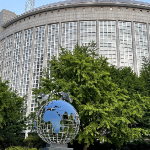At the 2023 United Nations Climate Change Conference (COP28), an international delegation of mayors and city officials led by C40 Co-Chair Yvonne Aki-Sawyerr, the Mayor of Freetown, Sierra Leone, will unite to drive the urgent phaseout of fossil fuels, address climate injustices and call on world leaders to work with them as critical partners in tackling the escalating climate crisis.
For the first time ever, COP28 will open with a Local Climate Action Summit (LCAS), providing a formal platform for mayors at the heart of the multilateral negotiation space for mayors that are part of C40 and its sister organisation, the Global Covenant of Mayors for Climate & Energy.
The first-of-its-kind local summit at COP, hosted by the COP Presidency and Bloomberg Philanthropies in the COP28 Blue Zone, will recognise the critical role of local leaders in driving down emissions, addressing climate risk and driving climate progress at the national level.
Cities are responsible for 75% of global greenhouse gas emissions and have a critical role to play in reducing emissions and reaching critical climate goals but are facing an over US$3 trillion gap in urban climate finance at the same time that fossil fuel subsidies are at the highest level ever.
Mayors will unite in offering to continue leadership to halve emissions this decade, while advocating for global and national leaders to grant cities the critical funding, powers and support from national governments. This offer seeks to help limit global heating to 1.5°C above pre-industrial levels.
This call was echoed on Friday in an open letter by C40 Co-Chairs Mayor of London Sadiq Khan and Mayor of Freetown, Yvonne Aki-Sawyerr to Heads of State. The letter called for collective action to reduce our reliance on fossil fuels, which is at the root of the climate crisis.
C40 announced an updated Cities Climate Transition Framework in response to the UN Secretary General’s High-Level Expert Group recommendations. It offers a clear plan for cities to follow in their fight against the climate crisis. This framework aims to help C40 cities cut their fossil fuel usage in half by 2030 and create 50 million green jobs. It emphasises the need for cities to collaborate with local communities, businesses, financial groups and government bodies to transform urban areas into net-zero emission, climate-resilient and prosperous places for everyone.
Cities, home to more than half of the global population, are acting to reduce fossil fuel use in highly polluting sectors. Their initiatives range from expanding and electrifying public transport that is accessible to all, to enhancing energy efficiency in homes and reducing energy use and costs. C40 cities are at the forefront of the climate movement, demonstrating a tangible blueprint for an equitable transition.
Every week a city experiences a new first in climate impacts. There is no clearer example that encapsulates this urgency for action than the recent unprecedented heatwaves of over 50°C in Rio de Janeiro, Brazil. Nearly all C40 cities report that they have faced, and continue to face, severe climate threats that jeopardise their economic and social prosperity. Mayors are calling for this COP to serve as a platform to propel adaptation and resilience efforts worldwide to ensure our cities remain liveable.
The message is clear: COP28 must be the COP of cities as well as national governments. It must close the urban finance gap and unlock investment that flows directly to cities to enable a win-win scaling up of critical inclusive climate action to improve livelihoods and limit global heating.
Mayor of Freetown and C40 Co-Chair, Yvonne Aki-Sawyerr said: “The situation that confronts us today is grave. It’s nothing less than self-harm on a planetary scale. For too long, we have let the fossil fuel industry run rampant, and it’s this industry that has created the very conditions of the climate crisis that we witness today. Across C40 cities our residents are struggling to access or afford energy and dealing with polluted air and water as a result of fossil fuels.
“The tide must turn. We call for the end of investment in polluting fossil fuels and the unlocking of local investments to shift to clean and equitable economies. In doing so, national leaders can work hand in hand with cities to seize the opportunity of climate action that creates more jobs, resilient economies, and healthier communities.”
Lord Mayor of Copenhagen and C40 Vice-Chair Sophie Hæstorp Andersen said: “COP28 presents a crucial opportunity to confront the fossil fuel industry’s role in the climate crisis. Cities are on the frontlines in the battle to overcome the climate crisis. However, we cannot do this alone, we call on global leaders to end fossil fuel subsidies and prioritise the transition to renewable energy sources.”
Mayor of Rio de Janeiro, Eduardo Paes said: “No human on earth should endure over 50 degree heat but this is the reality that my residents now have to cope with. This extreme weather affected all areas of life, from the young people losing precious school hours to the heat, workers who were unable to do their jobs, the most vulnerable who became unwell and those who sadly lost their lives.
“As we grapple with this crisis and head into COP28, we carry the unequivocal call for climate justice and the phasing out of fossil fuels that drive the climate crisis.
“We in the global south personally feel the devastation of unchecked emissions and urge COP28 leaders to hear us loud and clear: without adequate and direct funding to the world’s cities, we will remain dangerously off limiting global temperatures to 1.5°C. There is nothing greater at stake.”
C40 Executive Director, Mark Watts said: “At COP28 global leaders must agree to begin rapidly phasing out fossil fuels which are the primary cause of the climate crisis. This is the 28th COP and still there is no agreement to stop investing in oil, gas and coal. Mayors are doing their bit and taking action to reduce demand for fossil fuels through things like clean air zones and green building regulations. We need to make it cheaper and easier for people to live a lower carbon lifestyle, and difficult and expensive for vested interests in the fossil fuel industry to keep dominating economies. The impacts of the climate crisis are not a future problem – they’re happening now. Nearly all C40 cities have already faced extreme weather events which jeopardise their economic and social prosperity.”




